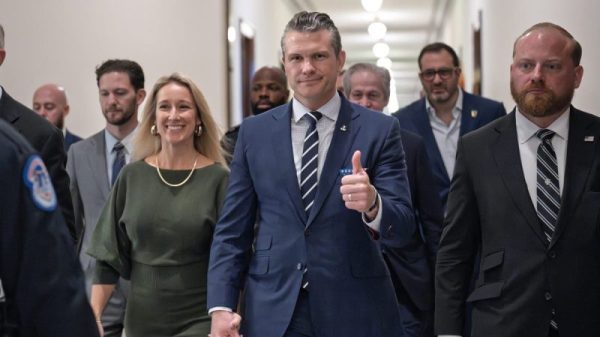“Like smoke from a cigarette or dreams that you soon forget,” Americans’ faith and trust in government is fading away.
These “Fading Away” lyrics, from the 1966 Motown release produced by Smokey Robinson and sung by The Temptations, provide apt images for the low confidence Americans have in Washington.
Recent reports document just how bad Uncle Sam’s reputation is. Yet, while the federal government’s standing in general is low, citizens feel much better about individual federal employees and agencies.
Meanwhile, U.S. democracy is fading, not just in trust but in fact, according to a major Washington think tank.
With the Jan. 6, 2021 Capitol insurrection, inspired by then-President Donald Trump — who continues to inflame politics with bogus claims the last presidential election was stolen — along with repeated threats of government shutdowns and the spectacle Republicans have made of House governance, how could confidence in American government and democracy not be shaken?
Here are the top lines from recent reports that indicate how bad it is:
● Trust in the federal government fell to 16 percent, near historic lows, in a Pew Research Center survey released in September. The high point in the last six decades was 77 percent in 1964, during the Johnson administration. Yet a March Ipsos poll found 76 percent, including 73 percent of Republicans and 85 percent of Democrats, view government employees favorably. Certain agencies, including the top-rated U.S. Postal Service, also have good or excellent ratings, according to Gallup data released last month.
● Fifty-three percent told an Associated Press-NORC Center for Public Affairs Research survey they have “hardly any confidence at all” in Congress, a small increase since March, with an almost invisible 3 percent declaring “a great deal of confidence” in Capitol Hill. About 39 percent expressed “hardly any confidence” in the executive branch and 36 percent had the same low opinion of the conservative Supreme Court.
● “The United States is experiencing two major forms of democratic erosion in its governing institutions: election manipulation and executive overreach,” says a new report from the Brookings Institution. That manipulation is distinct from alarmist Republican claims of voter fraud, which the report said “is almost nonexistent in the United States.” This election manipulation includes procedures making it harder to vote, or reducing an opposing party’s representation, such as through gerrymandering.
Furthermore, the Partnership for Public Service, a good-government organization that advocates against government shutdowns, said shutdown threats, which come with disturbing frequency, decrease confidence in government. It held its first Trust Summit in September because “low trust in government has serious implications for how the public interacts with our government and government’s ability to solve serious problems,” said Lindsay Laferriere, the partnership’s trust director.
While Republicans lead with broad but unsubstantiated claims of voter fraud and attempts to make voting more difficult, faith in government is weak across the political spectrum, though for different reasons.
Thomas Tebeau, 71, owner of Hostetter’s News Agency, a newsstand in Grand Haven, Mich., has “dubious doubts” about government. “I don’t like government making choices for the common good of the people overall. Sometimes, yes, sometimes no,” said Tebeau, who described himself as “moderate to ultraconservative” depending on the issue, yet “somewhat of a social liberal” Republican. “But the reality is that government, I firmly believe, sometimes has an agenda that they’re not showing.”
Sharilyn Brown, 75, a retired benefits administrator in Wilmington, Del., has trust that government leaders “will eventually do the right thing, but it’s not a whole lot at this point.”
She added, “I’m a little worried about our democracy.”
That worry about American democracy flows from the attack on the U.S. Capitol by Trump’s supporters and his continued provocations. If he gets back in office, “I think he wants an authoritarian government,” said Brown, a liberal Democrat.
Brown and Tebeau, however, expressed support for certain federal agencies and employees.
The Social Security Administration, Brown said, “seems to run very efficiently. I get my check every third Wednesday of the month, right on time.”
Most federal employees, Tebeau said, “are citizens just like you and me and they’re doing their job.”
But when people consider government, they think of “bickering politicians … who can’t get along,” Laferriere said. The organization wants to change that by centering federal employees (not the elected ones) and honoring outstanding staffers with Service to America Medals, a.k.a. Sammies.
Melissa Emrey-Arras, the Government Accountability Office’s director of education, workforce and income security, is this year’s winner of the Sammies’ Paul A. Volcker Career Achievement Medal. She said the discrepancy between those who are satisfied with specific government services and others who have little trust in government could be bridged by improving federal programs and promoting “all of the good things that government programs do.”
“Knowing how the government is making your life and the lives of your loved ones better,” she said, “could help you feel more positive about the federal government and the use of your tax dollars.”
Examples of that from the Sammies winners include, according to the partnership, one who began using “insects as natural predators to protect fruit and vegetable crops, reduce pesticides, save farmers money and protect the environment,” others who provide grants for a range of services to assist rural residents suffering from opioid abuse, and a Transportation Department team that helped “craft and implement a $1 trillion law that will modernize our highways, railroads and other infrastructure throughout the country and improve transportation safety.”
Yet, before a shutdown was averted in September, some Republicans sounded as though one would be acceptable, further damaging trust and confidence. Among them was Rep. Bob Good (R-Va.), who, in July, said that “we should not fear a government shutdown. Most of what we do up here is bad anyway.”
He should learn about the Sammies winners and other civil servants. There’s a lot of good in government, even if those on the right don’t notice.


































